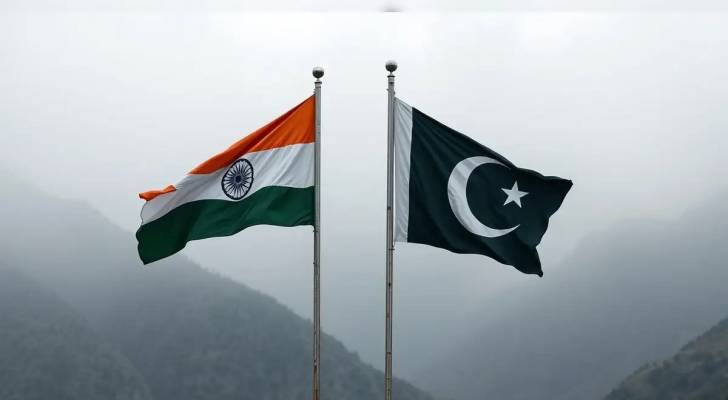(Photo: Getty Images)
India-Pakistan tensions surge as Kashmir border clashes intensify
Tensions between India and Pakistan, two nuclear-armed neighbors, have flared once again as both nations continue to exchange fire across the Line of Control (LoC) in the disputed region of Kashmir.
The recent skirmishes, which began following a deadly militant attack on April 22 in Indian-administered Kashmir that killed 26 people, mostly tourists, in the resort town of Pahalgam.
This incident has reignited longstanding animosities, pushing bilateral relations to their lowest point in years. As both countries ramp up military and diplomatic measures, the international community is urging restraint to prevent further escalation in a region that has long been a flashpoint for conflict.
Conflict background
Kashmir, a Himalayan territory divided between India and Pakistan since their partition in 1947, remains a core point of contention between the two nations. Both countries claim the Muslim-majority region in its entirety but administer separate portions, with the LoC serving as a heavily militarized de facto border.
The region has been the site of two of the three wars fought between India and Pakistan, as well as numerous smaller skirmishes and insurgencies. Rebel groups, some allegedly supported by Pakistan, have waged a decades-long insurgency in Indian-administered Kashmir, demanding either independence or unification with Pakistan.
India accuses Pakistan of fostering cross-border terrorism, a charge Islamabad denies, asserting it only provides moral and diplomatic support for Kashmiri self-determination.
The April 22 attack in Pahalgam, claimed by a little-known militant group called the Kashmir Resistance (also known as The Resistance Front, or TRF), has been linked by Indian authorities to Pakistan-based Lashkar-e-Taiba, a terrorist organization responsible for the 2008 Mumbai attacks.
The attackers reportedly targeted Hindu tourists, asking victims their religion before opening fire, killing 25 Indian citizens and one Nepali national. The massacre shattered claims by Indian Prime Minister Narendra Modi’s government that peace had been restored in Kashmir following the 2019 revocation of the region’s semi-autonomous status.
Recent cross-border clashes
The exchange of fire along the LoC began on April 24, 2025, and has continued intermittently, with reports of small-arms fire and, in some instances, heavier artillery. Indian military sources claim Pakistani troops initiated “unprovoked” firing from multiple posts along the LoC, prompting a retaliatory response.
Pakistan, however, has not officially confirmed these claims, though a senior official in Pakistan-administered Kashmir reported overnight clashes in areas like the Leepa Valley, with no civilian casualties noted. Posts on X indicate that fighting spread to other areas, including Samahni and Neelum, with unconfirmed reports of Pakistani forces using heavier weaponry.
On April 26, Indian media reported that Pakistan violated the ceasefire for a second consecutive night across the entire length of the LoC, with exchanges documented in the Uri sector. No casualties were reported in these specific incidents, but the sustained nature of the clashes has raised concerns about a broader escalation.
Indian security forces have intensified operations in Kashmir, launching “search-and-destroy” missions, deploying drones, and demolishing the homes of suspected militants, including those believed to be linked to the Pahalgam attack.
Diplomatic, economic reprisals
In response to the Pahalgam attack, India implemented a series of punitive measures against Pakistan, accusing it of facilitating “cross-border terrorism.” These include:
- Suspension of the Indus Waters Treaty: On April 23, India announced it would hold the 1960 water-sharing agreement in abeyance, a move that threatens Pakistan’s access to critical water resources from the Indus River system. The treaty, mediated by the World Bank, has survived previous conflicts, and Pakistan has called its suspension an “act of war,” warning of severe retaliation if water flows are disrupted. Analysts note that altering water flows would require significant infrastructure and time, but the symbolic weight of the decision has heightened tensions.
- Closure of the Wagah-Attari Border: The main land crossing between the two countries was shut, halting trade and movement. Pakistan reciprocated by closing the border from its side and suspending all trade, including through third countries.
- Diplomatic downgrades: India expelled Pakistani military advisers from its Delhi embassy, revoked visas for Pakistani nationals, and announced further diplomatic expulsions. Pakistan responded by expelling Indian diplomats, canceling visas for Indian nationals (except Sikh pilgrims), and closing its airspace to Indian airlines.
- Military posturing: India conducted large-scale air and naval drills, interpreted by analysts as a signal of potential military action. Pakistan’s military has vowed to defend its sovereignty against any “misadventure.”
Pakistan’s Prime Minister Shehbaz Sharif has called for a “neutral, transparent, and credible investigation” into the Pahalgam attack, denying any involvement and offering cooperation with international investigators. However, Indian Prime Minister Narendra Modi has vowed to “track and punish” the attackers and their backers “to the ends of the earth,” raising fears of a military response.
International reactions, concerns
The United Nations has urged both nations to exercise “maximum restraint” to prevent further deterioration, emphasizing the need for peaceful resolution through dialogue. However, US President Donald Trump downplayed the tensions, stating aboard Air Force One that such conflicts have persisted for centuries and that both countries would “figure it out.”
Trump, who condemned the Pahalgam attack and spoke with Modi to offer support, has not indicated a willingness to mediate, unlike his 2019 offer to do so. The US State Department is monitoring the situation but has avoided committing to a mediation role.




